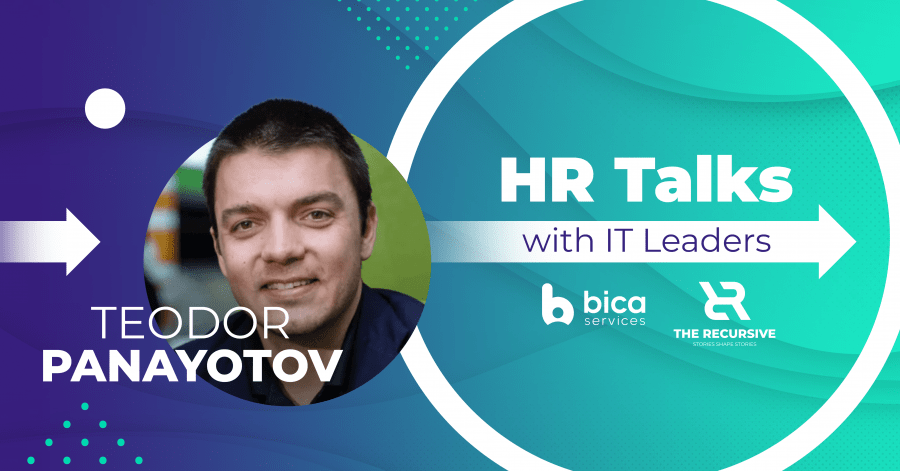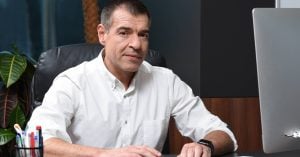HR Talks with IT leaders is a campaign organized in collaboration between The Recursive and BICA Services, one of the most prominent HR service providers on the Bulgarian market. Our goal is to give more visibility to the knowledge of how great tech teams are built. Every week, we will meet with accomplished entrepreneurs and managers who will share their personal experience and what’s their approach to leadership, communication, hiring, talent development and much more.
Our next guest is Teodor Panayotov, founder and CEO of Coursedot, a marketplace for IT upskilling courses and one of the fastest-growing tech companies in Central and Eastern Europe, according to Deloitte. With a network of over 3100+ IT instructors, the edtech startup is helping customers deliver training programs in the most efficient possible way. Earlier this year, the Coursedot team raised $1M in venture capital funding and reached a valuation of about $7.5M.
+++ HR Talks with IT Leaders ep. 1: Boyko Iaramov on giving back, transparency and leadership
+++ HR Talks with IT Leaders ep. 2: Radoslav Georgiev on the art of scaling your company fast
+++ HR Talks with IT Leaders ep. 3: Stoyan Angelov on successful team collaboration
+++ HR Talks with IT Leaders ep. 5: Mariya Rashkovska on product teams and talent development
What is the number one lesson about leadership you have learned over the past few years?
Really the number one is to be humble and listen to others, be it the team or external mentors.
I started as an IT professional and I would say I was quite arrogant 15 years ago, but through the years I met so many people who helped me and helped the company and taught me various lessons. I really saw that the saying is right – once you start to expand your circle of knowledge you realize how many things you don’t know and the more and more you know, you see that there is even more you don’t know.
I can give you examples with mentors I had. I distinctly remember meeting with Vassil from Telerik and we had a very tough discussion during which he gave me an important piece of advice. The outcome was that it actually saved Coursedot, it moved us from losing money back in 2018, to being profitable in Q4 in 2018. Another example – I went to the first cohort of BIH (the Bulgarian Innovation Hub). I was one of the lucky few who actually was able to be there physically in San Francisco and I met Pavlina and Bogomil, and all the other successful people from Silicon Valley that are part of the program. It was a truly humbling experience, because I went there with businesses which had already been running for a couple of years, had some customers, and I thought I knew how to organize the sales, the strategy. It turned out I really didn’t.
How do you as a leader communicate your failures to the team? Do you have any tips for young leaders who need to recover from a mistake they made?
It is tough to acknowledge your own bullshit. You have to be super honest. At least that’s what I am always trying to be. Being completely honest and transparent as possible with everyone on the team, being open to their feedback, sometimes rough feedback. We had cases where someone had seen a problem and escalated it before I did, and it had turned out they were right, and I was wrong.
So, being super honest and taking responsibility is a major factor for the leader. There is no one you can hide behind. You have to be there, you have to be responsible.
It is also super important to buy time and this is not something orthodox in the startup way of thinking, especially in the US startup way of thinking of hyper growth, of blitz scaling, etc. There are times where you can buy time and be profitable and expand a little bit slower if you are not 100 % sure if you should put gasoline on the fire. Sometimes it is a matter of being able to survive so you can fight the next battle, since it is not a sprint, it is a marathon.
It is over when you run out of ideas, but not over when you lose a battle. Being able to survive that battle is key, buying time is critical, at least in my very humble experience.
Let’s dive deeper into the team culture of Coursedot. What are the currently most important skills and mindset you foster in your teams and how do you actually do it on a practical level?
The function of Coursedot being a small organization is the ability to communicate with everybody. Anyone can come up with ideas or challenge the way we are doing something. It’s super important to have critical thinking and be able to respond quickly to changing circumstances. Because as you know COVID came and literally changed our business overnight. I really think that being mentally flexible is the most important thing. Everything else is learnable. If your mind is set in stone it is a really hard thing to change. Being able to understand that what you have been doing yesterday may not work a year from now is quite critical.
In the second part of this interview, we talk about Teodor’s approach to employee training and development within Coursedot and what’s his perspective on the development of truly autonomous organizations.








